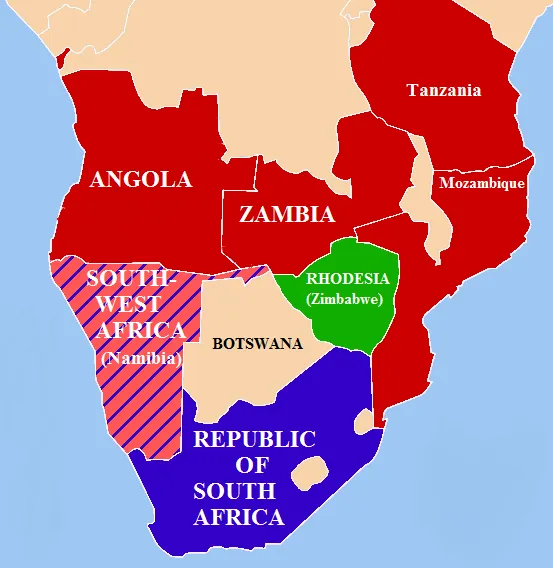Cold war theory included the domino theory
The domino theory was a theory prominent from the 1950s to the 1980s, that posited that if one country in a region came under the influence of communism, then the surrounding countries would follow in a domino effect. The domino theory was used by successive United States administrations during the Cold War to justify the need for American intervention around the world.
South Africa thought followed suit and felt that the Shipping trade route around the South of Africa would be a prize that the Soviets would want to gain control of.
They tried to push this and other agendas to gain support from the US an Europe.
South African diplomat Charles Theodore Te Water, who was received by President Harry S. Truman in the United States in 1949, even proposed his government join the North Atlantic Treaty Organization (NATO). Noting that the country had become the world's principal source of uranium, the South African Department of External Affairs reasoned that "on this account alone, therefore, South Africa is bound to be implicated in any war between East and West"
Prime Minister Malan took the position that colonial Africa was being directly threatened by the Soviets, or at least by Soviet-backed communist agitation, and this was only likely to increase whatever the result of another European war. Malan promoted an African Pact, similar to NATO, headed by South Africa and the Western colonial powers accordingly. The concept failed due to international opposition to apartheid and suspicion of South African military overtures in the British Commonwealth.
Although initial efforts didn't bare much fruit South Africa got involved in the Korean War and this led to a thawing of relations between the US and SA with technological assistance being rendered and covert relations.
As Africa began decolonization, which would result in the withdrawal of colonial powers, the soviets supported many of the independence movements in the hopes of setting up new states sympathetic to their cause and gaining some control of the mineral resources attached thereto.
As this decolonization progressed it led to the formation of The Frontline States (FLS) a loose coalition of African countries that were committed to ending apartheid and white minority rule in South Africa and Rhodesia. All had varying levels of communist backing.
The FLS only disbanded once Nelson Mandela became president of SA.
These states supported SA and SWA and Rhodesian liberation movements in as many ways possible, allowing insurgents passage through their countries and to set up training bases, receive and store arms etc.

By Katangais, CC BY-SA 3.0, Link
As a result, SA felt that neighboring countries were fair game when it came to "defending" themselves and it was on this basis that they became involved in the Angolan War of Independence as a state bordering on South West Africa.
SWAPO bases were already set up in Zambia and some insurgents were arriving from there via Southern Angola. SA was not keen to see the fall of the Portuguese in Angola as that would likely bring SWAPO one step closer.
Quotes sourced from Wikipedia.
Other posts in this series
The piece of the cold war nobody told you about - Africa's forgotten war
The air battles
The SA Fighter Aircraft
The SA Bomber Aircraft
The conflicts deep roots and start